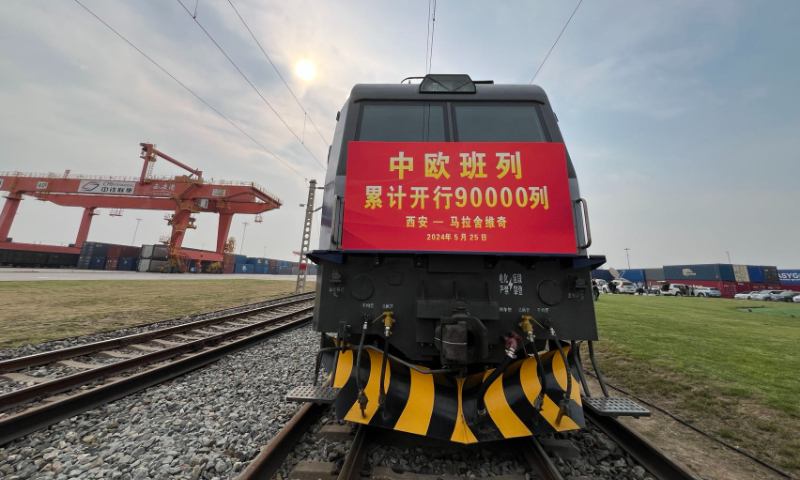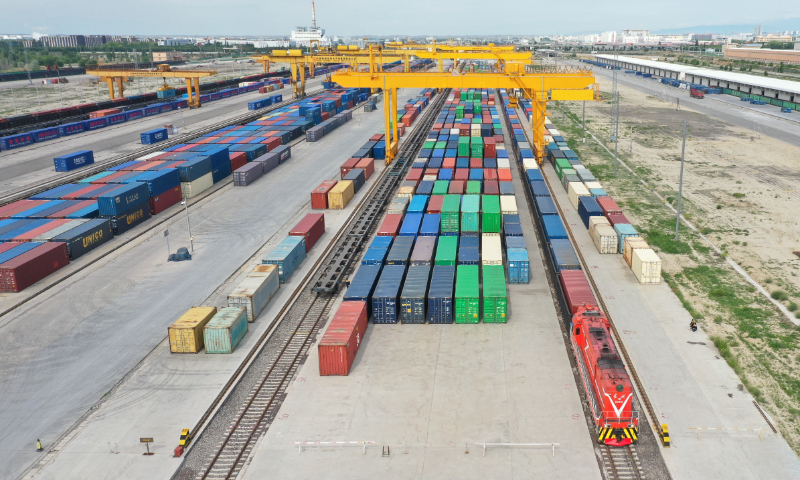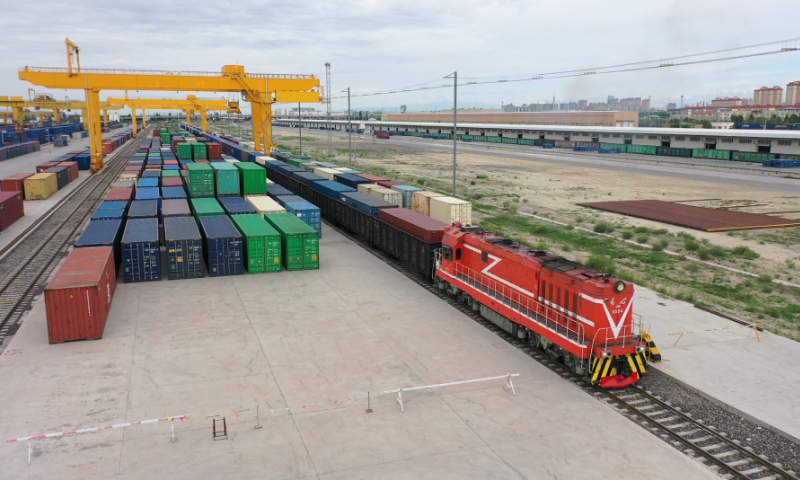
The X8157 freight train departs from the Xi'an International Port Station in Xi'an, Northwest China's Shaanxi Province on May 25, 2024. Photo: Liu Yang/GT
Editor's Note:
As the Chinese economy faced some challenges in recent years, some Western officials and media pundits have stepped up their smear campaign against China. They cherry-pick information and distort facts to hype their narratives such as "Peak China," but they always turn a blind eye to China's economic resilience and development potential. In order to set the record straight, the Global Times is launching a multimedia project, including in-depth articles, objective analysis and visual arts, to present a comprehensive and true picture of Chinese economy. This is the seventh installation of the series.

The Urumqi International Land Port Area in Northwest China's Xinjiang Uygur Autonomous Region. Photo: Liu Yang/GT
The China-Europe freight train service has rapidly evolved, becoming an indispensable transport artery since its launch 13 years ago as a flagship program under the China-proposed Belt and Road Initiative (BRI).
Amid the expanding routes, the freight train service has not only facilitated the trade with enhanced capacity and efficiency, but also bolstered the economic development for localities along the route.
In May 2024, the train service recorded the highest monthly transport volume. The number of China-Europe freight train runs increased by 14 percent year on year to 1,724 trips, while cargo transport totaled 186,000 twenty-foot equivalent units of goods, up 13 percent on a yearly basis. During the same month, the total number of China-Europe freight train has surpassed 90,000.
The Global Times reporters recently traveled to multiple Chinese cities that act as leading stations connecting the extensive network. The operations of different parts contributing to running the train services seen by the Global Times reporters vividly showcased the vitality of the project.
Elevated serviceIn 2011, a train loaded with electronic products sounded horn and embarked on a journey from Tuanjiecun Station in Southwest China's Chongqing Municipality to Duisburg in Germany, marking the inauguration of the China-Europe freight train service.
"With the promotion of the China-Europe freight trains, there has been a noticeable increase in acceptance and recognition among customers. The efficiency and timeliness of delivering goods to foreign countries via these trains have also been exceptional," a manager of the operations department at Yuxinou (Chongqing) Logistics Co surnamed Hu, told the Global Times.
Since its initial launch, Chongqing has continuously diversified transported items and connected with more destinations, while the route from the city to Duisburg remaining the mainstay.
Departing from Chongqing, trains will reach Duisburg via Northwest China's Xinjiang Uygur Autonomous Region and pass through Kazakhstan, Russia, Belarus, Poland, to Germany, covering a route of more than 11,000 kilometers. The route also extends to the Netherlands, Belgium and other European countries, according to a separate statement Yuxinou shared with the Global Times.
The major commodities include a wide range of products from electronic products, automotive vehicles and parts to textiles and food products, which can reach the destinations in just two weeks' time.
At Urumqi International Land Port Area in Xinjiang, cranes were seen busily loading containers onto a waiting train. With a loud whistle, the train loaded with 50 containers set off westward along the foot of the Tianshan Mountains.
"After the goods arrive at the land port area, [merchants] can complete the assembly and related formalities within 24 hours and the products will be sent to Khorgos Port or Alashankou Port," Ma Yun, an official from China Railway Urumqi Group, told the Global Times.
At present, Urumqi is connected to 21 China-Europe freight train routes, reaching 26 cities in 19 countries. From January to April this year, a total of 435 China-Europe trains departed from the Urumqi International Land Port Area, representing a year-on-year increase of 13.5 percent.
Behind the bustling scenes, China's rising pace of tech innovation has become a ballast to support the smooth and efficient operation of the train domestically and internationally.
"We have independently developed a thermal insulation carriage that can maintain a constant temperature of 10-20 C inside. This technological upgrade ensures that goods remain protected during transportation to colder countries in winter, safeguarding them from potential damage," Hu said.
The design of the thermal insulation carriage is just one of their technological innovations, according to Hu. Satellite and base station monitoring systems are now integrated, which allow the location of the carriages to be updated in the system every two hours, enabling real-time monitoring of the operation.
New technologies are being adopted in other industrial sectors. "With the help of a special network platform, enterprises can complete related procedures online, which improves auditing efficiency. Also, we have strengthened communication with the Kazakhstan customs department, with real-time mutual notification of the train departure and arrival times," Bai Hanguo, an employee at the Urumqi branch of China Railway Container Transport Corp, told the Global Times.

The Urumqi International Land Port Area in Northwest China's Xinjiang Uygur Autonomous Region. Photo: Liu Yang/GT
Bolstering developmentThe China-Europe freight trains service currently covers 223 cities in 25 European countries and over 100 cities in 11 Asian countries, with the trains reaching almost the entire Eurasian continent, according to China State Railway Group Co.
As a milestone project under the BRI, the service has played a vital role in bolstering the development of many industries as well as promoting local economic development.
In Chongqing, the operation of the China-Europe freight trains has realized hundreds of millions of dollars of cargo transportation value, while offering wider market potential and development opportunity for local manufacturing and service industries, according to Yuxinou.
The company said that the China-Europe freight trains operating in Chongqing have transported some 200 billion yuan ($27.52 billion) worth of IT products, and helped promote the landing of global players including HP, Acer, and Asus with their foundries and a number of supporting enterprises.
The train service has also promoted the export of vehicles and auto parts from Chinese brands, while promoting projects from leading auto giants such as Porsche and Audi to settle in Chongqing, with the import and export value of vehicles hitting nearly 70 billion yuan, according to the statement by Yuxinou.
In addition, the launch of the China-Europe freight train service has attracted hundreds of logistics companies to establish operations in the Port of Duisburg in Germany, helping create more than 20,000 jobs, according to media reports.






